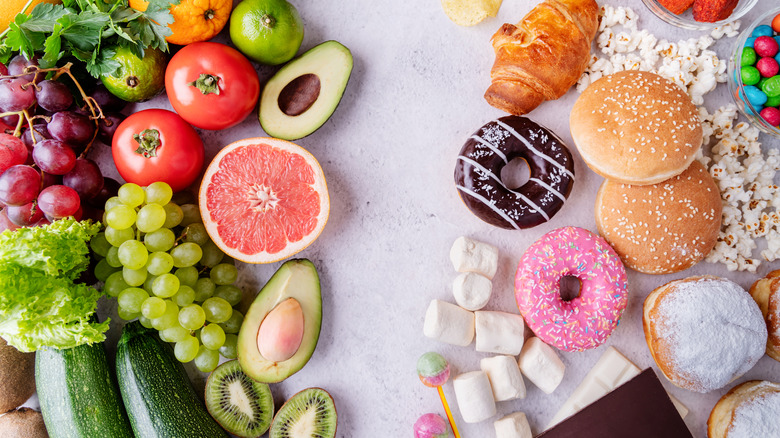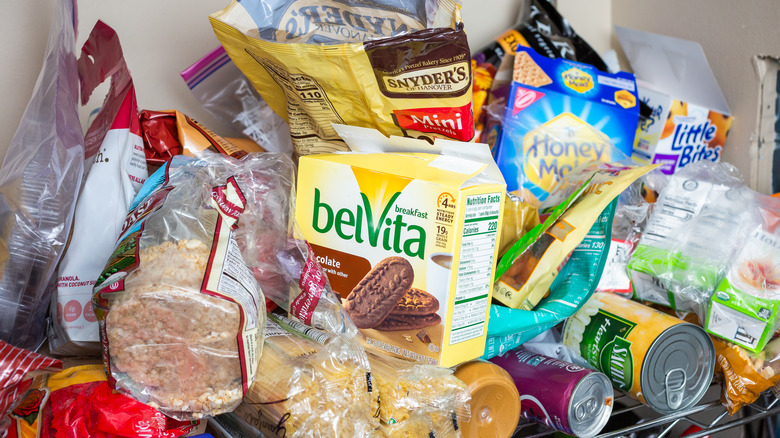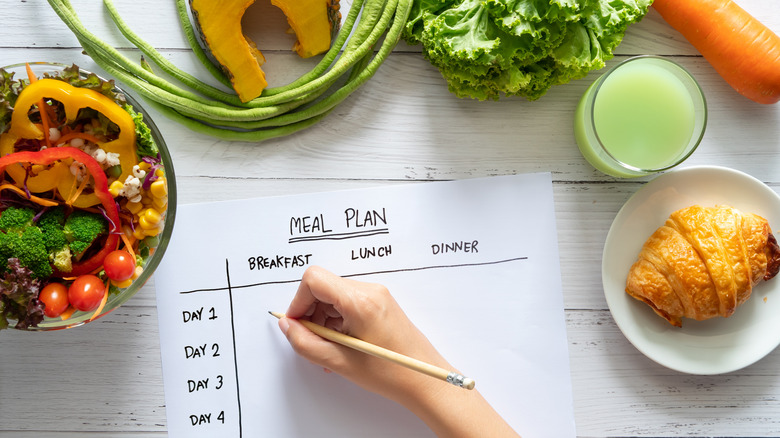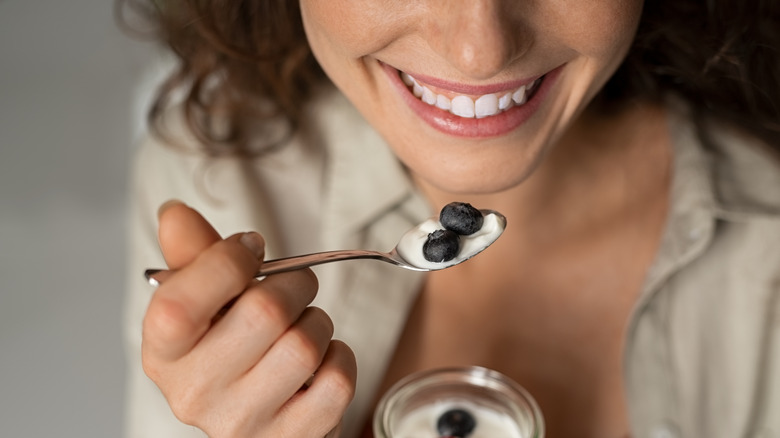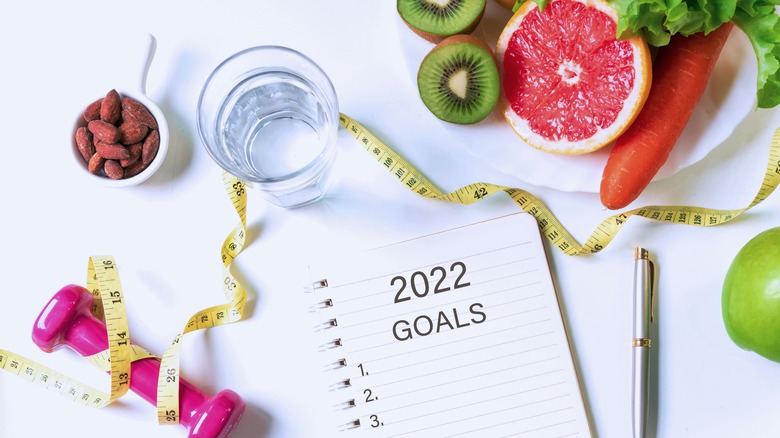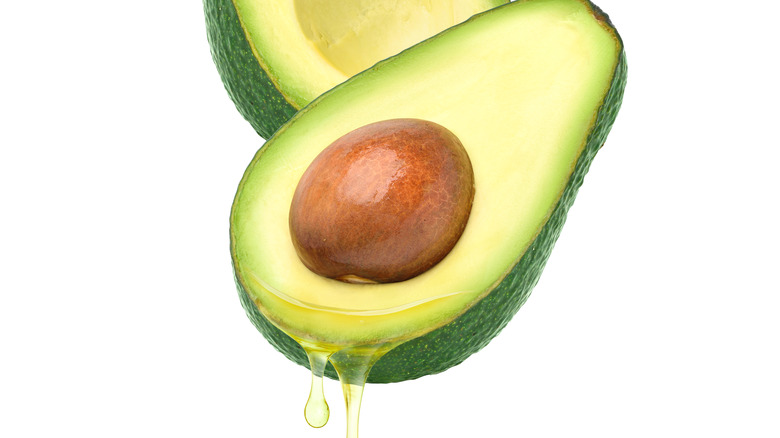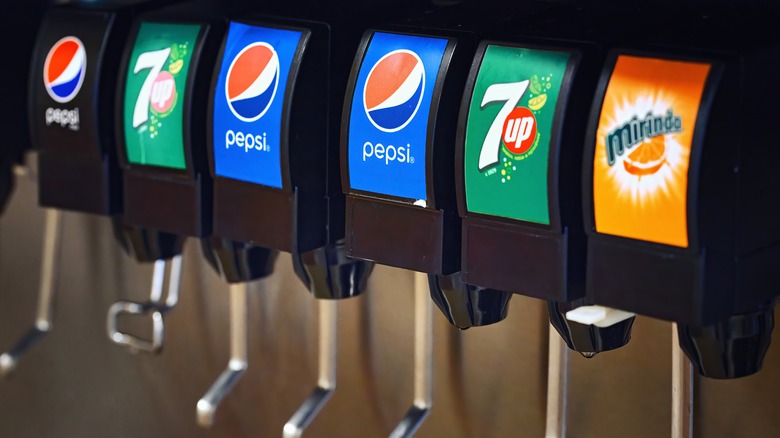Tips To Help You Move Toward A Healthier Diet
Changing your diet can be hard, especially if you have certain unhealthy habits deeply ingrained. The good news is that with a little planning, discipline, and education, healthy dietary changes are absolutely possible and within reach. Whether you want to lose weight, heal or even prevent certain health conditions, incorporating healthy foods into your diet is, generally speaking, an excellent choice.
One trick to making sure your healthy habits stick is by breaking things off into bite sized chunks — so to speak — and not overwhelming yourself. J. Ryan Fuller, clinical psychologist and executive director of New York Behavioral Health who specializes in weight loss spoke to Insider and explained, "My clinical approach with my clients is to gradually change a few number of factors first. Because we have a finite amount of willpower, and the more things we remove...the harder it is." That means if you were thinking about taking any of the items on the list, adopting them all at once, and expecting immediate results, you might want to take a gentler approach.
With that said, there are a wealth of benefits to incorporating healthier foods into your diet, which include a longer life, weight management, healthier immune system, and a lowered risk of heart disease, cancer, and diabetes (via CDC). If you need inspiration on your healthy eating journey, continue reading.
Get rid of junk food
If you are starting to eat healthy from scratch, you might have to do some damage control in your cupboards to set yourself up for success. Cookies, chips, ice cream, and other highly processed foods aren't going to make the cut for this next step, and according to health food experts, your best bet is to reorganize or clear them out. Conner Middelmann Whitney, nutritionist, health writer, and cooking instructor wrote for Psychology Today that when we buy unhealthy food and are feeling tired, stressed, or particularly hungry — guess what? We're going to eat it.
In her article, she references a speech given by psychologist and mindful-eating expert Brian Wansink at the American Psychological Association's annual meeting, who says "Most of us have too much chaos going on in our lives to consciously focus on every bite we eat. The secret is to change your environment so it works for you rather than against you." His advice is to place all junk food out of reach, and replace it with healthier options such as fruits and veggies "at eye level." Keeping junk food in sight or eating in front of the television are what Wansink calls "hidden eating traps," and avoiding them can help you lose 2 pounds a month.
Create a meal plan
Having a plan in place when you are transitioning to healthy eating can mean the difference between success and struggle. In order to get you started on the right foot, experts at Healthline have compiled a list of 28 healthy meals that are easy to prepare for those beginning to eat healthy. These meals focus on staples you may already have in your pantry, with the idea of helping you save time and money.
For breakfast, the site recommends giving overnight oats a try. This recipe may be particularly good for those in a time crunch, as they can be prepared the night before. Loaded avocado toast is another breakfast item that can be made relatively quickly, and includes heart healthy avocados on top of whole grain toast, with healthy toppings of your choosing. For lunch, the site recommends this slow cooker lentil soup. Finally, wrap up a day of healthy eating and try this one-pot chicken teriyaki dish with zucchini noodles.
The CDC also recommends sticking to a meal plan for dieting success. If you want to develop your own personal meal plan, the site says to write down a list of your favorite meals, make sure they include enough fruits and veggies — and choose lower calorie ingredients at the grocery store.
Eat filling and satisfying foods
Part of making sure you'll be successful in your healthy diet is by incorporating foods that taste good and that will fill you up. Experts at Healthline suggest that adding foods rich in fiber and protein will help keep you fuller longer, which can help prevent snacking on high fat and sugar foods. One of the foods the site suggests adding to your shopping list is fish. The site explains that the protein you get from fish may keep you fuller for longer compared to other sources of protein including eggs, and even beef. In a study published by the journal Obesity, researchers found that overweight and obese men who ate diets high in protein and fat were less likely to crave food during the day, and didn't crave unhealthy food at night.
Furthermore, if you are prone to craving salty and crunchy foods, Healthline experts recommend going for popcorn as an alternative to unhealthier snacks such as potato chips. Experts explain that popcorn is high in fiber, which makes you feel fuller, and to try cooking it in an air popper, or on the stove using a miniml amount of fat.
Experiment with healthy recipes
The mere thought of eating healthy makes many people groan, which is why it's so important to find ways to make it more exciting and feel less like a burden. Exploring different recipes that incorporate healthy foods can be a great way to keep things interesting and help you stick to your new diet. Healthline experts agree, and say that most people tend to repeat the same recipes on "autopilot" year after year, which can lead to boredom. The site suggests picking at least one new healthy recipe each week, which can help add nutrients to your diet. The site also suggests adding twists to some of your favorite recipes by including new herbs and spices, or fruits and vegetables you don't usually eat.
If you are pressed for time, there are plenty of healthy recipes available online that can be prepared in 30 minutes, so being rushed is no longer an excuse. Dishes like this silverbeet fatteh feature super healthy chickpeas as a primary ingredient, with garlic, yogurt, and lemon, as well as a variety of herbs and spices.
Get your whole family on board
If you've ever started a diet and had to deal with a steady influx of temptations circulating around your household by your family, this one's for you. Several experts spoke to U.S. News and explained just why getting the family on the healthy-eating bandwagon is so important. Antonette Hardie, registered dietitian nutritionist at the Ohio State University Wexner Medical Center in Columbus, spoke to the site and said, "The best way of eating for families is to eat together. Creating healthy meals at home and time for everyone to sit together, free of distraction is the best way to create healthy eating habits and relationships with food."
Sara Bagheri, registered dietitian at CalOptima in Orange County, California adds that when developing a meal plan for your family, it's important to take everyone's needs into consideration. "The key is to educate yourselves about what defines healthy eating habits and diet in general, then learn about your own family's nutritional needs, considering age, activity level, medical conditions and desired goals," she explained. Experts at the site explain that some diets work better than others for families, and that the Mediterranean diet, a vegetarian diet, and the Mayo Clinic diet are just a few that work best.
Accompany your new diet with exercise
One way to boost the effectiveness of your dieting plans is to add working out to the mix. It might seem a little out of the box, but science has proven that working out can actually trigger you to want to eat better. According to Science Alert, this phenomenon is called "the transfer effect," and a group of scientists from Indiana University studied it on 6,244 participants and found that there is a strong link between the two habits. The 2015 study followed participants from the ages of 18 to 22 three times: once at their initial ages, again when they were between the ages of 23 to 27, and lastly when they were 27 to 31. The researchers found that engaging in exercise increased the consumption of both fruits and vegetables for participants over time.
Science Alert summed up some of the data from the research and explained that because both eating well and exercising have the same goal of improving your overall health, it's easy for people two switch between the two. Another reason is that once people have committed to exercise, making it a regular habit, that actually makes it easier for them to start thinking about additional "feel good" habits to add to their routine. Win-win!
Don't forget to set goals
Setting sail on your healthy eating journey without a map is likely to lead you into some murky territory. Setting goals is one of the best ways to help you stay on track with whatever plan you have, and the experts at the Center for Healthy Eating and Activity Research at UC San Diego School of Medicine agree. According to their site, research suggests that it takes an average of 21 days to create a new habit, and setting a goal for yourself can help you stay motivated during the most challenging parts of the process.
To start your goal-setting process, experts say it's important for you to set goals that are actually important to you — so if it's something you feel on the fence about, it may be better to reevaluate your plan. Instead of setting a goal that is oriented toward a specific result, set goals that are more in line with the process. For example, instead of saying "I'd like to lose X pounds by eating healthier," you can say "I'd like to start leading an overall healthier lifestyle and become more conscious of my eating habits." If you experience setbacks in your healthy eating goals, experts at UC San Diego School of Medicine suggest breaking goals up into smaller ones to make them easier to achieve.
Make sure you get enough calories per day
There are a lot of traps you can fall into when dieting, and one of the easiest ones is not consuming enough calories per day. While you may associate healthy eating with consuming a low amount of calories, experts suggest re-thinking that perspective. According to Healthline, severe calorie restrictions can contribute to a number of health problems such as infertility and weak bones. Calories serve a number of purposes in your daily bodily functions including managing your basal metabolic rate, digestion, and physical activity. According to the site, your basal metabolic rate basically means how many calories are used to assist your heart, brain, kidneys, and lung function properly. Furthermore, calories are used to help digest and metabolize food, as well as provide fuel for your daily activities.
One major setback you can experience consuming too few calories is actually lowering your metabolism. Healthline explains that eating a diet too low in calories can decrease your metabolism by at least 23%. Additional side effects of a low calorie diet can be fatigue and nutrient deficiency. Key vitamins such as iron, folate, and vitamin B12 may be missing from your diet if your calories are too low, which can lead to both fatigue and anemia.
Don't completely eliminate fat
In the past there has been a lot of debate about whether fat is good or bad for you, and also conversations about what type is best. Healthline explains that fat serves a number of purposes in your body including managing your energy levels, hormones, the way you absorb nutrients, and has the ability to protect your organs. This means you can finally ditch any old school propaganda about fat being the enemy when it comes to eating healthy. Mindy Haar, registered dietitian and assistant dean of undergraduate affairs at NYIT School of Health Professions spoke to Healthline and further explained, "Fat is an energy provider. Fats are the last to leave the digestive tract and thus provide satiety." And so, this process can help you feel fuller longer — you'll avoid overeating or snacking too much.
Healthline suggests that it's safe to add polyunsaturated fats to your diet in the form of fatty fish, flax seed, and "liquid plant-based cooking oils." You can also add monounsaturated fats to your diet in the form of avocados, nuts and seeds. Lastly, feel free to throw in (with restraint) saturated fats in the form of butter, cream, and cheese. While saturated fats are okay in moderation, the site suggests that unsaturated fats get the highest rating overall.
Replace candy with fruit and other healthier alternatives
This one is unlikely to come as a surprise. When switching to a healthier diet, candy bars and other high sugar treats are going to have to be significantly reduced. Healthline explains that on top of having no nutritional value, most candy is loaded with sugar, artificial ingredients and can lead to a number of health conditions including obesity and type-2 diabetes. However, if you are prone to having a sweet tooth, the good news is that your cravings can be replaced by healthier alternatives. To start, experts at the site say to replace candy with fresh fruit such as strawberries, which are low in calories but packed with fiber and vitamin C. If you are of the "peckish" variety, having a small fruit on hand like raspberries can be a great alternative to picking up small pieces of candy.
The site also recommends snacking on dried fruit, as it contains even higher concentrations of nutrients than regular fruit. In addition to the nutrients, it also contains higher amounts of calories and sugar, so make sure not to overdo it. For those who love ice-cream, the site recommends "nice-cream," as an alternative. Nice cream essentially refers to a fully fruit based ice cream that is blended with a mixer such as peanut butter or coconut milk, and then frozen.
Replace sugary drinks with water
Similarly to replacing your favorite candy with fruit, nixing your favorite soda and replacing it with water is another step toward a healthier diet. Healthline explains that of all the things you can drink, sugary beverages are by far the worst. These drinks contain added sugars, which have been linked to heart disease, obesity, and diabetes. They can also lead you to consume excess calories, as the calories from the sugar do not satiate the same way calories from food do. The plus side is that if flat water doesn't excite you, there are plenty of alternatives you can incorporate into your diet to quench your thirst. For example, sparkling water provides the fizziness you'd get from soda, and if you add natural fruit juices like lemon or lime, you get additional flavor as well.
However, experts at Eat This, Not That! suggest staying away from diet sodas, as they may contain carcinogens, and can actually lead to weight gain. Registered dietitian Miriam Jacobson, spoke to the site and explained, "Even though diet drinks are calorie-free, they cause insulin to be released in your gut because their artificial sweeteners are sweet like sugar. Insulin is your body's primary fat-storage hormone, so consuming it will cause the body to hold onto any extra fat."
Eat out less
One of the best ways to make sure that you're eating healthy and eliminating unhealthy fats and added sugars is to limit the meals you eat out and make your own food. In addition to the unknown ingredients you may find in food when you dine out, there are other diet pitfalls to be aware. For example, serving sizes at restaurants tend to be significantly larger than what you would serve if you were eating at home. One study found that when eating out, people typically consumed upwards of 200 calories more than those who prepared their meals at home (via Nature).
If you thought that simply avoiding fast food chains was the answer to your healthy eating dilemma, research has largely proved otherwise. Another study found that meals consumed at non-fast food restaurants contained an average of 1,200 calories per serving, which is only 5.1% less calories than what you may find at fast food chains (per Journal of the Academy of Nutrition and Dietetics). Furthermore, the study concluded that 92% of those meals at restaurants "exceeded typical energy requirements for a single eating occasion."
Don't shop when you're hungry
If your tummy is rumbling and you feel like making your way to the grocery store, you may want to have a (healthy) bite or two first. You've probably heard the dieting rule that it's best not to shop on an empty stomach — but you may be surprised to find out that there is scientific evidence to back this notion. One study evaluated 68 people ranging in age from 18 to 62 years old, 71% of which were female (per JAMA Internal Medicine). The study participants were asked to fast for five hours before the study, and upon arriving, a portion of the participants were given a snack to satisfy their hunger, and another portion were not given anything. Both groups were then asked to shop at an online grocery store that offered both high calorie and low calorie options.
As you might guess, the participants that were hungry leaned toward the higher calorie options compared to the ones who'd been given the snack. The study concluded that even short term fasts (five hours in this case) can lead to unhealthy food choices, and that it's recommended to not be food deprived if you're going grocery shopping.
Reward yourself for your progress
It might seem like climbing a mountain — but after all your hard work clearing your diet of unnecessary sugar and unhealthy fats, it's going to be time to give yourself a pat on the back. Instead of rewarding yourself with unhealthy food, experts at Eat This, Not That! suggest treating yourself in other ways. The site goes on to offer examples of ways to treat yourself (non-food wise) and starts out by suggesting a high speed blender as an option. This is an excellent option for someone who regularly makes smoothies and finds their tried and trusted blender may be getting worse for the wear.
In addition to making smoothies you can use a high quality blender to prepare healthy soups, pestos, and even nut butters. Another great way to treat yourself is by subscribing to a healthy meal service. If you're pressed for time, healthy meal services can reduce the burden to cook by providing ready-to-eat meals from providers such as Blue Apron or Hello Fresh.

